5 Best AI Agent Tools
- May 31, 2025
As artificial intelligence rapidly evolves, AI agent tools are making a difference across many domains—from businesses to individual users. Thanks to their capabilities in automation, decision-making, and natural language understanding, AI agents go beyond traditional digital assistants and can independently carry out complex tasks.
In this article, we’ll take a closer look at the different types of AI agents and highlight the top 5 AI agent tools in detail.
Top 5 AI Agent Tools
1. Vivollo
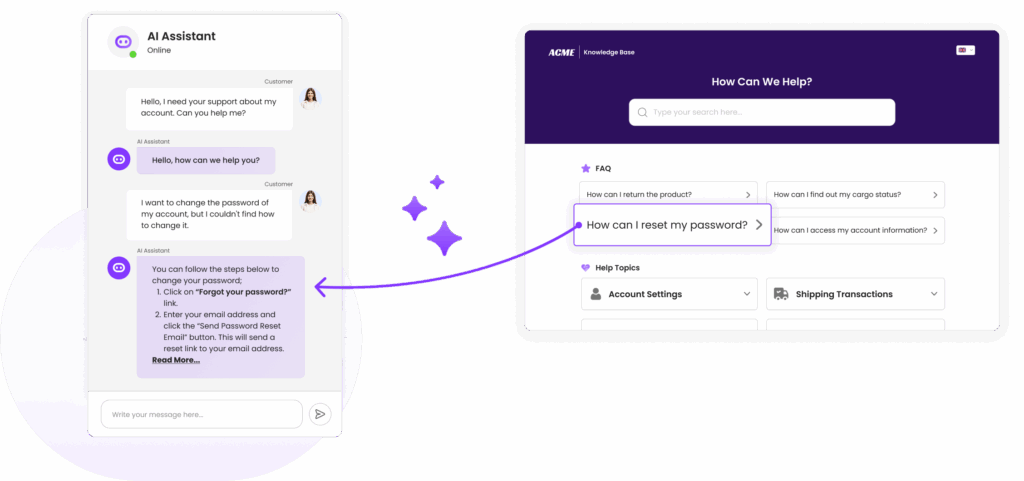
Vivollo is a no-code platform that enables businesses to build AI-powered chat agents trained on their own knowledge bases—such as websites, documents, FAQs, and more.
With a drag-and-drop interface for designing conversational flows, Vivollo combines AI-generated responses with features like form collection, lead qualification, and support automation. It offers a truly multichannel experience, operating 24/7 across websites, WhatsApp, and other digital platforms. It also integrates seamlessly with Grispi for advanced human handoff capabilities.
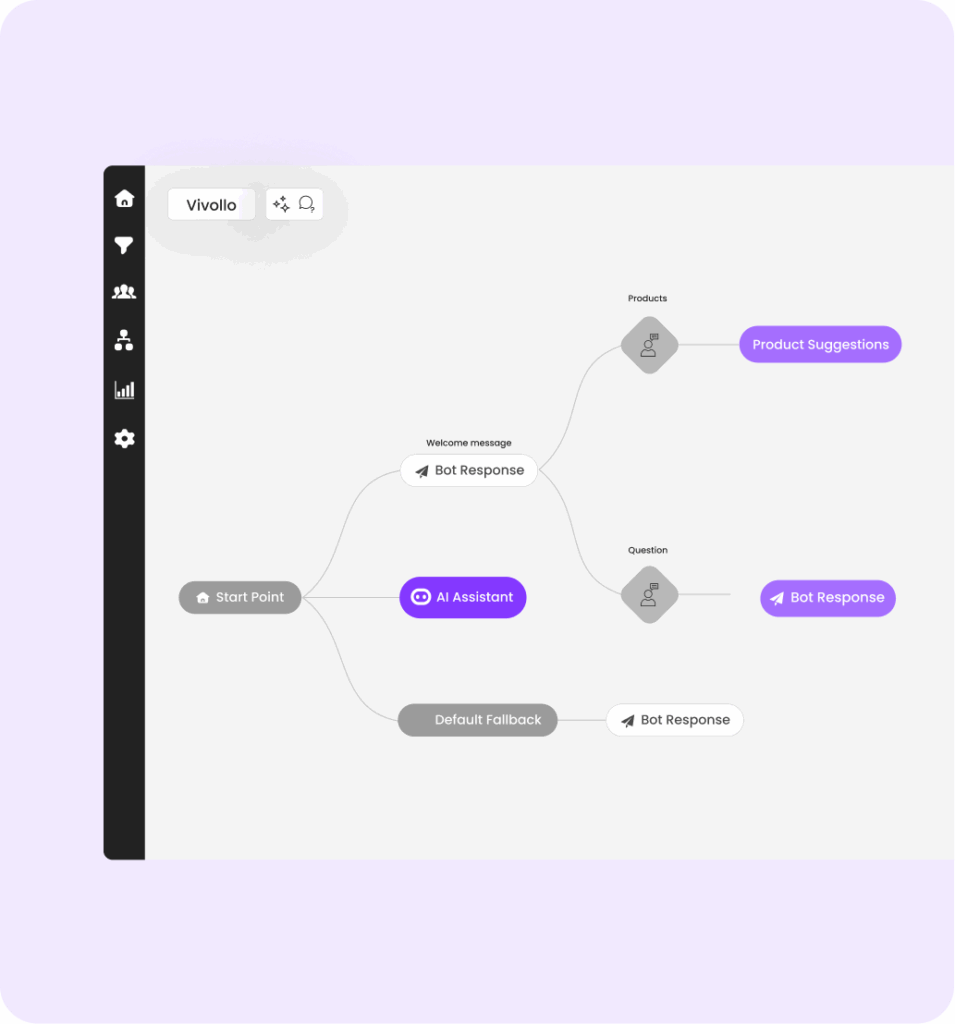
Knowledge Base Support
- Websites: Vivollo can crawl a business’s website to train the AI assistant with relevant content.
- Documents: Supports importing information from PDF, Word, and other document formats to enable contextual responses.
- FAQ Structures: Interprets structured Q&A formats to deliver more accurate and controlled answers.
- Dynamic Updates: Content can be updated anytime, ensuring the AI agent always works with up-to-date information.
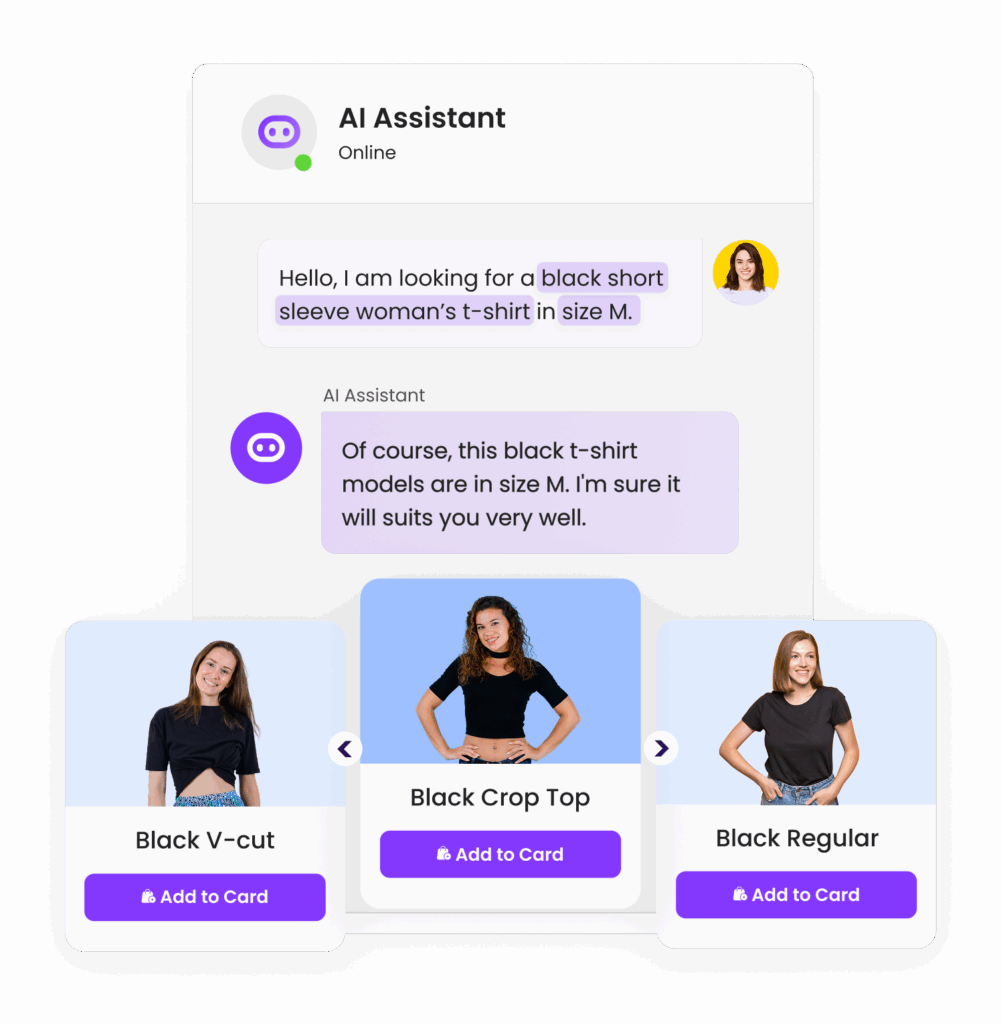
Features
- No-Code Flow Builder: Create custom conversational journeys using a simple drag-and-drop interface. Combine buttons, logic, and AI answers with ease.
- Proactive Messaging: Trigger conversations based on visitor behavior, such as time on page or exit intent.
- Multichannel Deployment: Easily deploy your assistant across web, WhatsApp, Messenger, Shopify, and more.
- Lead and Form Capture: Collect names, phone numbers, and emails directly through the chatbot.
- Grispi Integration: Automatically route complex inquiries to live support agents when AI reaches its limit.
- Multilingual Support: Integrated with Google Translate to serve customers in over 100 languages.
- Template Library: Use ready-made templates for product recommendations, promotional flows, and support forms.
- Full Customization: Adjust the look, feel, tone, and widget placement to match your brand.
- Analytics & Reporting: Track key metrics such as session volume, conversion rates, and click-throughs.
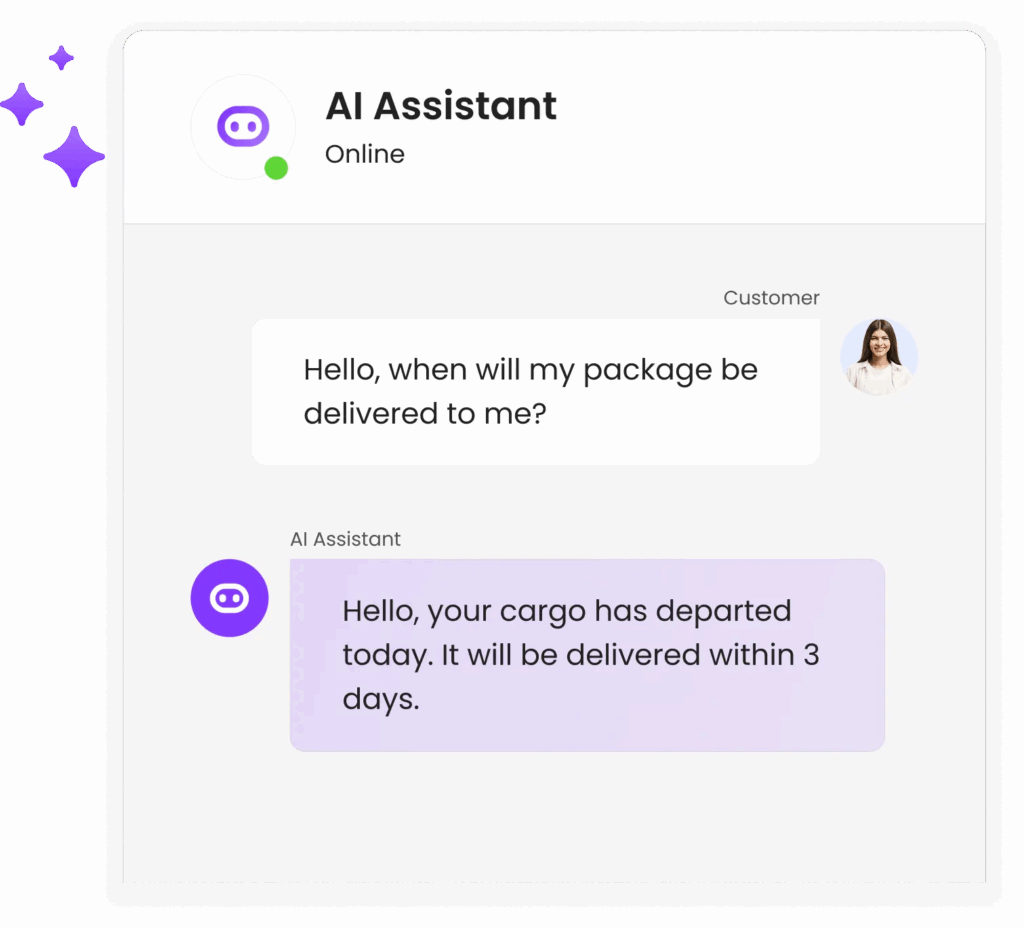
Who Is It For?
- E-commerce Businesses: Automate tasks like product suggestions, order tracking, and inventory queries.
- SMBs & SaaS Startups: Streamline sales and support operations without relying heavily on human agents.
- Support-Heavy Websites: Reduce team workload by answering repetitive queries via AI.
- Agencies & Marketing Teams: Proactively deliver campaigns, lead forms, and quote flows via chatbot.
- Global Companies: Serve diverse audiences with real-time, multilingual AI support.
Vivollo helps businesses automate customer engagement while improving efficiency and satisfaction. With its user-friendly interface and robust feature set, it’s an ideal solution for any organization seeking AI-enhanced customer service.
2. Chatbot.com
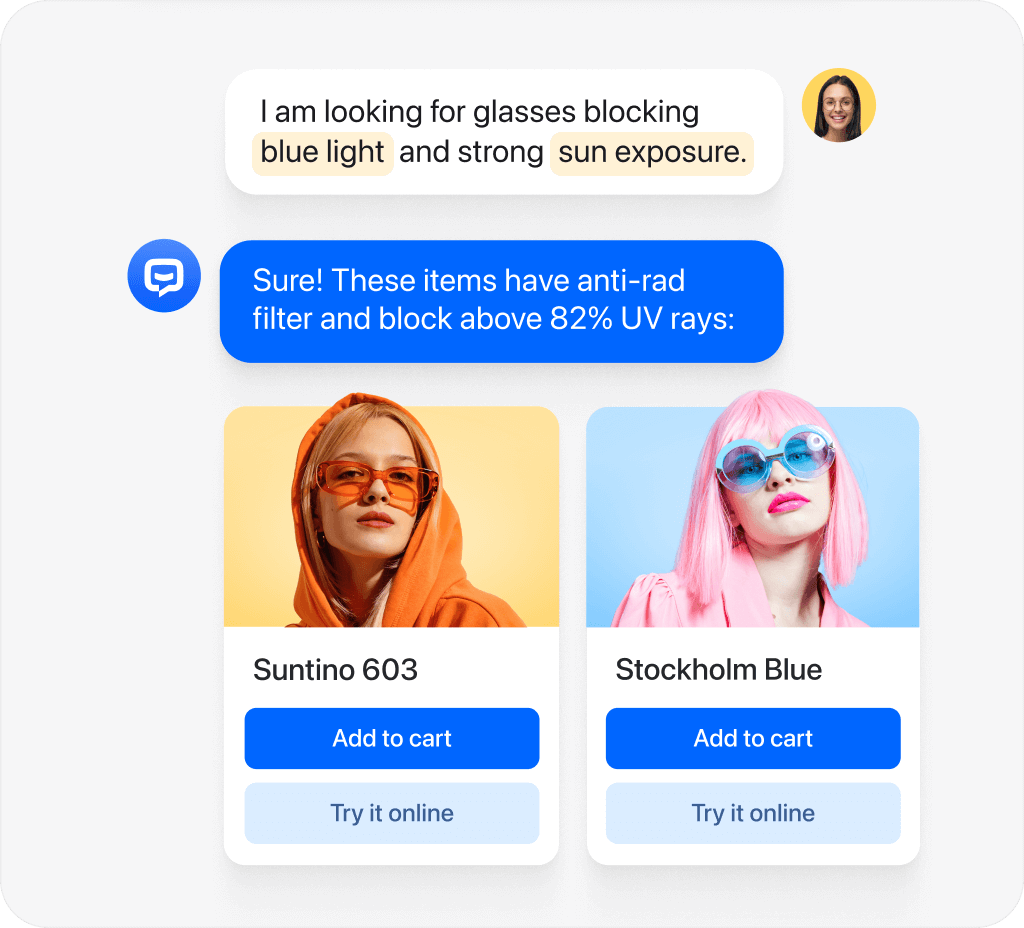
Chatbot.com is a chatbot creation platform combining rule-based flows and ChatGPT-powered AI responses, all managed through a user-friendly drag-and-drop interface. It’s especially well-suited for customer support use cases.
Knowledge Base Support
- Import data from websites, databases, and documents to train your AI model.
- Supports advanced URL crawling for continuous content updates.
Features
- Visual bot builder — no technical skills required.
- Prebuilt templates for common use cases like order tracking, reservations, and lead capture.
- Integrations with LiveChat, Messenger, Slack, Zendesk, and more.
- Seamless transfer to human agents when needed.
- Triggered messages and behavior-based conversation initiation.
Who Is It For?
- SMBs, e-commerce sites, and customer support teams.
CustomGPT.ai
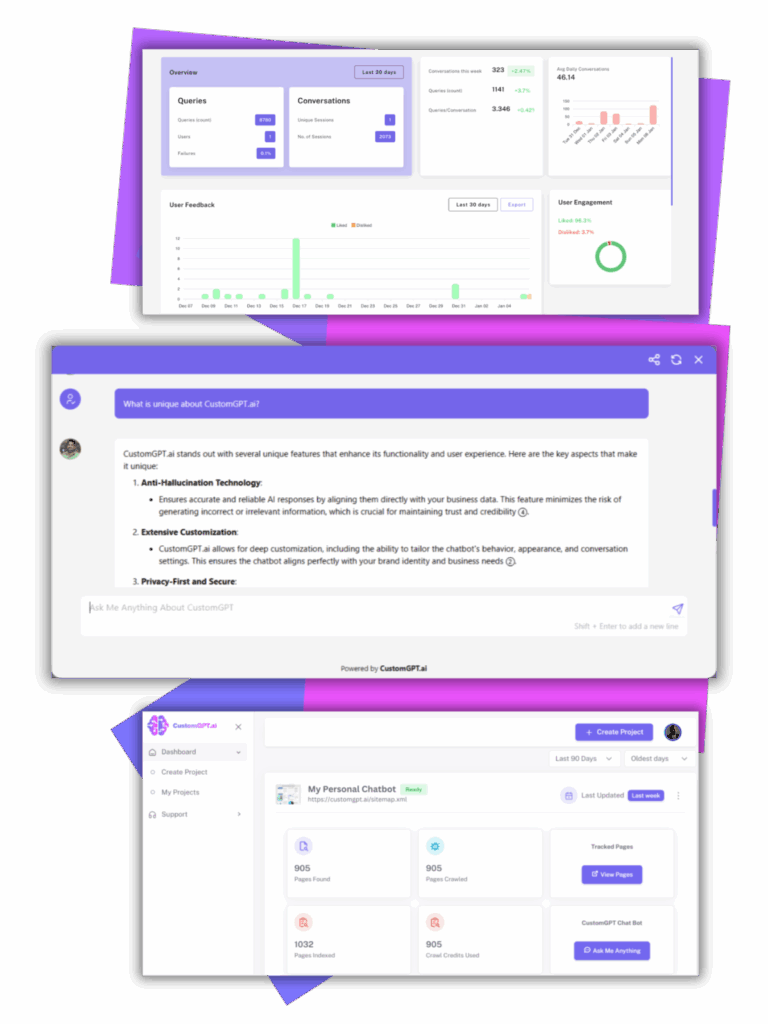
CustomGPT.ai allows you to create private, GPT-based AI agents trained on your own data—such as documents, URLs, PDFs, or sitemaps—without writing any code.
Knowledge Base Support
- Crawl URLs and sitemaps directly via built-in web scraper.
- Upload PDFs, DOCX, and other file types for training.
- Refresh the knowledge base as content evolves.
Features
- Easily integrate into custom apps via API.
- Each agent is trained exclusively on your proprietary data.
- Retrieve chat responses in structured JSON format.
- Create domain-specific sub-models based on categories.
- Enterprise-grade security (HIPAA, SOC 2, ISO compliant).
Who Is It For?
- Enterprises, SaaS platforms, and companies needing secure, domain-specific documentation automation.
DocsBot AI
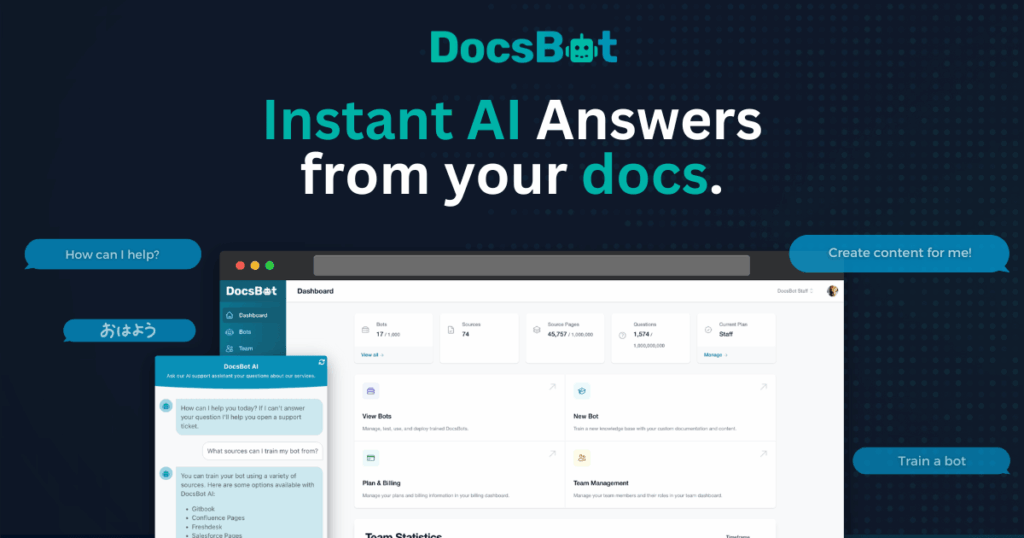
DocsBot AI creates AI chatbots trained on content from Notion pages, Markdown docs, websites, GitHub Wikis, PDFs, and more.
Knowledge Base Support
- Seamless integration with Notion, Google Docs, and GitHub Wiki.
- Upload support for files such as PDF, TXT, CSV, and DOC.
- Web scraping functionality for page content extraction.
Features
- Easy-to-use UI with drag-and-drop flow editor.
- Embeddable web widget + Slack, Discord, and Microsoft Teams integrations.
- API access for connecting to external systems.
- Compatible with your own ChatGPT API key for cost optimization.
- Quality scoring and analytics for conversations.
Who Is It For?
- Startups, developer teams, and support teams looking to build scalable AI assistants on existing documentation.
Forethought
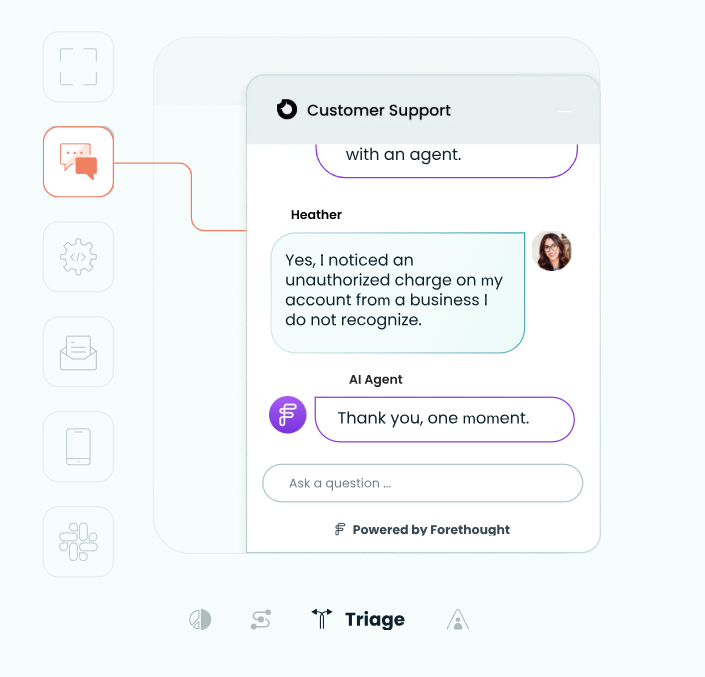
Forethought is an enterprise-grade AI platform built to accelerate customer support operations by leveraging historical ticket data and CRM records. It’s known for its “Resolve AI” technology.
Knowledge Base Support
- Trains on CRM systems, ticket history, help center articles, and internal knowledge bases (e.g., Zendesk, Salesforce).
- Leverages topic clustering and automatic labeling to learn from past data.
Features
- Resolve AI: Automatically responds to support tickets with AI.
- Triage AI: Routes requests to the correct support group.
- Assist AI: Provides real-time response suggestions to human agents.
- Deep analytics, feedback tracking, and forecasting tools.
- Integrates with Zendesk, Salesforce, Intercom, and other enterprise tools.
Who Is It For?
- Large enterprises, call center operations, and high-volume support teams seeking automation and faster resolution times.
What Are the Types of AI Agents?
AI agents are systems designed to pursue specific goals by gathering data from their environment, processing it, making decisions, and acting accordingly. Based on their use cases, AI agents can be categorized into:
- Reflex-Based Agents: React instantly based on predefined rules. Used in simple scenarios.
- Model-Based Agents: Build an internal model of the environment and make decisions based on past experiences.
- Goal-Oriented Agents: Develop strategies to achieve a defined goal. Operate with planning algorithms.
- Learning Agents: Continuously improve by learning from their environment. Often powered by machine learning.
LLM-based agents, in particular, stand out in understanding and executing text-based tasks, making them increasingly popular among developers and businesses alike.

Are AI Agents Risky?
While AI agent systems offer numerous benefits, they also come with certain risks:
- Uncontrolled Automation: Poorly configured agents may generate faulty outputs or trigger harmful operations.
- Security Vulnerabilities: Agents with access to data may be exploited by malicious actors.
- Misleading Outputs: If trained on unreliable data, LLM-based agents can provide inaccurate guidance.
Therefore, it’s essential to implement scenario testing, authorization systems, and human oversight before deploying AI agents.
AI Agents Are Shaping the Future
AI agents have moved far beyond traditional automation, evolving into systems capable of making and executing decisions on their own. With applications ranging from customer support to internal process automation, these tools—when properly configured—can significantly boost efficiency and reduce labor costs.
However, like all powerful technologies, AI agents must be used with caution and control. Responsible implementation with clear scenarios, ethical boundaries, and transparency will unlock their full potential.
Contact us
Fill out the form for detailed information and demo account and we will call you.
